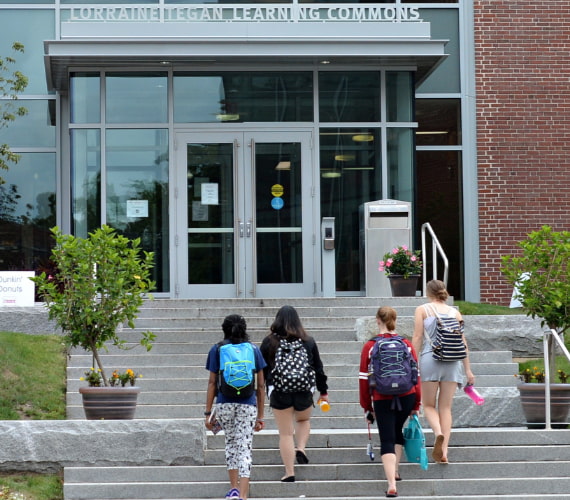A business education can serve as a gateway to almost any industry, giving you the versatile skill set to lead in any industry. However, in a global corporate landscape that’s rapidly evolving, it isn’t effective to simply study theoretical business principles anymore. Getting a firsthand look at the decision-making methods of industry professionals is the best way to develop the skills necessary for success.
At the Sloane School of Business and Communication, Regis College faculty members enrich the curriculum with their practical insight and industry expertise. Through real-world case studies, collaborative projects, and expert mentorship, students gain ongoing opportunities to evaluate business objectives and challenges from a range of perspectives.
If you’re interested in furthering your business education, discover how the Regis degree completion program can prepare you to excel in corporate and entrepreneurial environments.
How Regis Brings the Real World into the Classroom
A major challenge of business degree programs is that their success depends on fostering mindset skills that will help professionals navigate dynamic environments. While students need a foundation of technical skills like finance, management, and marketing, they also have to transform how they think and become adept at strategizing to truly thrive as business leaders.
Here's how Regis’ curriculum brings together the right elements of business to prepare graduates for the corporate world.
1. Analyzing case studies and real-life scenarios.
Case studies bridge the gap between theory and real-world application, providing a more enriched learning experience.
“There are two main approaches to teaching business,” says William Koehler, Dean of Regis’s Sloane School of Business and Communication. “One is the quantitative theoretical model—what's thought of as the MIT approach. And the other is the case study model—what's thought of as the Harvard approach. We tend to focus on the case study approach, so all of our courses utilize case studies.”
Regis uses the case study model to cultivate the following elements of business education:
- Critical thinking
- Strategy
- Decision-making skills
Business dilemmas are often complex and multi-faceted, with social and ethical implications that go beyond a company’s bottom line. By examining real challenges companies have faced, students can become familiar with the intricacies of analyzing and solving business problems.
2. Collaborative projects with businesses.
Working on real projects will always be one of the best ways to develop business management skills.
“Practical experience and theoretical learning should be an iterative process where one is informing the other as you go along,” Koehler explains. “Our students get a lot of that, which is important because our students don't always come to us with a lot of real-world experience.”
Collaborating with business teams and their clients allows students to assess a problem in the context of specific needs and operating conditions. They also gain the opportunity to see the impact of the solutions they implemented and whether or not they were effective.
Regis College routinely provides opportunities for students to apply what they learn through partnerships with innovative companies, such as:
- Biogen
- Novartis
- Boston Public Health Commission
- Congress Wealth Management
Koehler shared another example of students working with a local nonprofit, Lawrence Partnership, on economic development and education for an impoverished community in Massachusetts.
“We worked with them to help design a marketing plan for the organization to attract new members,” Koehler says. “But with the help of a Regis College intern, we also put together a social media plan for the organization for how it could better reach out to the community.”
3. Inviting guest speakers and industry experts.
Bringing in industry experts as guest speakers is a core part of how the program builds upon academic knowledge. Seasoned professionals can offer practical insight and dynamic perspectives that transcend traditional classroom theories.
“One guest speaker we've had across a couple of courses is Paul Lonergan, the CEO and founder of Congress Wealth Management—a major investment firm in Boston,” Koehler says. “He often talks about how his company identifies investment opportunities, but also how they’re grappling with 21st century changes. This brings up topics like incorporating diversity, equity, and inclusion in their hiring practices and their corporate culture.”
Exposure to success stories and challenges like this give students a deeper understanding of strategic and operational factors that affect different industries. Getting the chance to interact with experts, ask questions, and evaluate ideas not only leads to more intensive thinking, but encourages students to consider how they can innovate in the future.
4. Global immersion and entrepreneurship opportunities.
As organizations contend with trends like digital transformation and sustainability, it’s increasingly beneficial for business students to consider global perspectives. Studying business solutions that have been implemented in other cultures provides a broader knowledge base to draw upon as graduates become leaders and entrepreneurs.
Graduates will also be more successful at achieving innovation when they’re able to collaborate with diverse thinkers to refine their ideas. For example, in recent years, Regis has hosted students from the Frankfurt University of Applied Sciences in Germany to work with business students on week-long intensive projects
“We had them working on business plans in social entrepreneurship, a new business idea that has a strong social or environmental component to it,” Koehler says. “As part of that, we hosted a college-wide Shark Tank event where teams of students presented their business ideas and the winners received prize money. And we'll be working with the faculty to see whether they can make their business ideas something more tangible.”
5. Choosing faculty who bring real world experience in the classroom.
Faculty will make or break any academic experience. In business education, it's even more crucial for instructors to be proficient managers who have observed how organizations function at various levels. That way, when students have complex questions or want to explore theoretical principles, faculty members can offer practical advice based on real-world examples.
Students in the Regis business management program have the benefit of learning from professionals with well-rounded expertise.
“All of our faculty have at least five years of executive/managerial experience in the real world before we bring them on,” Koehler adds.
A Closer Look at Regis Business Management Faculty
A knowledgeable and accomplished faculty are the backbone of a high-quality business education program. Regis College strives to curate a team with a multidisciplinary background and experience across various sectors, ranging from commerce to nonprofits to government.
Here’s a quick overview of the world-class experience the Regis business faculty brings to the program.
William Koehler
Dean William Koehler is the head of the Sloane School of Business and Communication and a serial entrepreneur who has launched four businesses and a nonprofit. For 25 years, he has worked as an educator, including dean and assistant dean roles at Bay State College School of Management and the University of Massachusetts College of Management, respectively.
As a former operations manager, marketing manager, and recruiter, Koehler has expert knowledge of what it takes to build successful business teams and maintain their resiliency. He continues to leverage his insights and stay up to date on corporate trends by working with small businesses and nonprofits as a consultant.
Christopher Kubik, DBA
Christopher Kubik is a professor of Accounting and Finance and the director of the CFP® Registered Program. Before joining Regis College, he served as the Director of Transportation for the State of Indiana, handling the financial management of public transit, highway development, railroad maintenance, and more. Throughout his expansive career, Kubik has worked for Fortune 50 companies and experimented with entrepreneurship as a Domino’s franchisee.
In academia, he has worked as the Dean of Mount Ida College School of Business, and successfully oversaw the accreditation of the business programs at Colby-Sawyer College.
Dr. Charlene Geary
Dr. Charlene Geary is Sloane Business School’s Assistant Professor of Global Business Management. Prior to teaching at Regis, she trained aspiring leaders through Northeastern University’s College of Professional Studies Undergraduate Leadership Program.
Geary has been a successful real estate entrepreneur for two decades, leading to roles as a published author and public speaker. Geary draws upon a wealth of experience across multiple positions in the telecommunications industry, and has developed the Personal Entrepreneurship concept to teach future leaders to grow and innovate through continuous personal improvement.
The Future of Business Education
The strategies that enable professionals to excel in business continually change as new socio-economic trends take shape. Regis College employs continuous updates in course content to provide the most forward-thinking educational platform, ensuring students gain relevant skills and knowledge.
The Business Management degree completion program at Regis College is specifically designed for prospective students who have earned some undergraduate credits and are ready to further their education. The program gives students a streamlined path to attaining a full bachelor's degree, broadening management skills, and opening doors to higher-level positions. If you’re interested in advancing your education beyond undergrad, the program also provides easy pathways into Regis’s three business master’s programs.
To learn more about this degree and whether it aligns with your goals, reach out to the admissions team for help exploring your options.




